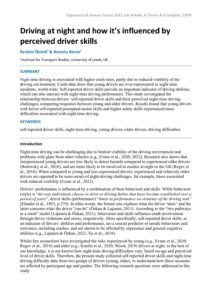| Document | Author İbrahim Öztürk & Natasha Merat |
| Abstract Night-time driving is associated with higher crash rates, partly due to reduced visibility of the driving environment. Crash data show that young drivers are over-represented in night-time incidents, world-wide. Self-reported driver skills provide an important indicator of driving abilities, which can also interact with night-time driving performance. This study investigated the relationship between drivers’ self-reported driver skills and their perceived night-time driving challenges, comparing responses between young and older drivers. Results found that young drivers with lower self-reported perceptual-motor skills and higher safety skills experienced more difficulties associated with night-time driving. |

